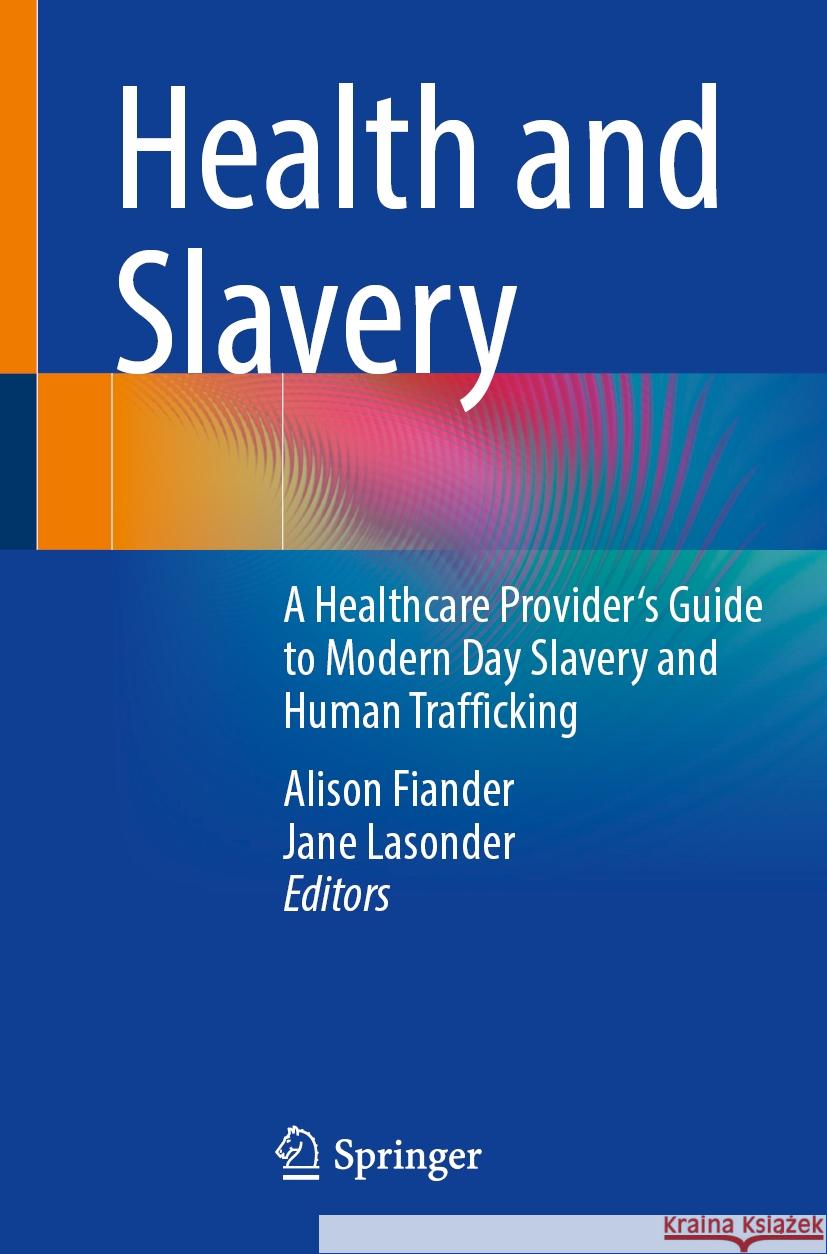Health and Slavery: A Healthcare Provider's Guide to Modern Day Slavery and Human Trafficking » książka



Health and Slavery: A Healthcare Provider's Guide to Modern Day Slavery and Human Trafficking
ISBN-13: 9783031483189 / Angielski
Health and Slavery: A Healthcare Provider's Guide to Modern Day Slavery and Human Trafficking
ISBN-13: 9783031483189 / Angielski
(netto: 314,25 VAT: 5%)
Najniższa cena z 30 dni: 327,68 zł
ok. 20 dni roboczych.
Darmowa dostawa!
An overview of Modern-Day Slavery and Human Trafficking.- The size of the problem globally & in the UK.- Forced Labour, Labour Exploitation and Debt Bondage.- Forced Criminal Activity.- Criminal Exploitation, Child Criminal Exploitation & County Lines.- Sexual Exploitation.- Domestic Servitude.- The Role of Healthcare Professionals in tackling MSHT.- Communicating with victims of modern slavery.- A healthcare response to MSHT.- A Healthcare Provider response to MSHT.- The global response to modern slavery and Global Health.- A survivor’s voice.- The law and MSHT.- Addressing health in the United Nations legal and policy frame work against trafficking in persons.- National Referral Mechanisms.- When Doing No Harm Means Making the Hard Call: How Civil Society and Medical Practitioners can join hands in anti-trafficking efforts.- The UK response to MSHT.- Organisations working in Modern Day Slavery and Human Trafficking (MSHT).- VITA - Addressing Human Trafficking as a Health and Public Health Problem.- Helen Bamber foundation.- The Salvation Army.- Hope for Justice.- Relentless.- Red Alert Task Force.- Haven of Light.- One by One.- Causeway.- Twentyfour-Seven Inc.- Bright Fame.- El Roi, Freehearted - The Netherlands.- Step Up Stop Slavery.- Case Study of organisation working in the field: Aviv Ministry, Tel Aviv, Israel.- Case Study: Taliza’s story – sexual exploitation.
Professor Alison Fiander was appointed Chair of Obstetrics & Gynaecology at Cardiff University in 2002: practicing as a Gynae-oncologist and colposcopist and
developing a programme of research investigating Human Papillomavirus infection and the management of HPV-related anogenital neoplasia.
Having worked in Sub-Saharan Africa for 4 years earlier in her career, Alison has a keen interest in addressing global maternal mortality and morbidity and left Cardiff University in 2015 to take up the role of Clinical Lead for the Royal College of Obstetrics and Gynaecology (RCOG) Leading Safe Choices programme, training healthcare professionals in sexual reproductive health, in Tanzania and South Africa.
She subsequently became the Clinical Lead for the RCOG Centre for Global Women’s Health and coordinated writing and development of the RCOG Essential Gynaecology skills course for Low- and Middle-income countries. As part of this Alison wrote a module on Gender Based Violence (GBV) to help train Healthcare professionals in the recognition and management of women affected by GBV. Alison retired from the RCOG in 2018 but still works as an independent consultant in Global Women’s Health in addition to teaching global health to Cardiff medical
school undergraduates; teaching women’s health on-line for LMIC and directing an on-line postgraduate diploma/MSc in International Women’s Health. She acts as a First Responder for the Salvation Army for the Modern-day Slavery and Trafficking team.
Jane Lasonder is an international speaker and author. She has lived experience of MSHT. She has undertaken consultancy work for the UN, the WHO and OSCE and spoken in the European parliament and other parliaments.
She is a member of ISTAC (International Survivors of Trafficking Advisory Council ) of the OSCE ODIHR and a member of the Interparliamentary Task Force on Human trafficking, The Interparliamentary Taskforce on Human Trafficking is a consortium of Members of Parliament and Congress, government leaders, and lived-experience experts from more than 25 nations and 6 continents who are committed to creating policy solutions and educating lawmakers to stop one of the greatest humanitarian crises in the world today, human trafficking.Her first book was called Jane, an autobiography written together with Henk Stoorvogel. She also wrote a book called ‘Red Alert’ about human trafficking to raise awareness of this terrible crime. She decided to start the Red Alert task force after her own experience and hearing stories from victims and survivors of their experiences in health care settings where the signs of human trafficking were missed. She remains concerned that most medical schools don't teach students how to spot the signs of slavery or what to do if they suspect someone is a victim.
She is aware that most schools and universities don't talk about MSHT or about the dangers of grooming.
Jane has trained as a first responder for the Salvation Army where she worked with potential victims of slavery and assessed them via the NRM (national referral mechanism) for the home office.
Aimed at Healthcare Professionals (doctors, nurses, psychologists etc & healthcare students, (eg medical, nursing, allied professionals,) to raise awareness, recognition and guidance on what to do in the face of suspected Modern Slavery and Human Trafficking (MSHT).
This textbook includes consideration of indicators of MSHT, communication skills, organisations working in the field, reporting of suspected cases.
The majority of victims of MSHT come into contact with healthcare professionals (HCPs) at some point in their journey but HCPs report feeling ill equipped to recognise or manage a potential victim, (90% of victims of MSHT come into contact with a HCP but only 10% of HCP would recognise and know what to do). As such this topic should be represented in undergraduate and post graduate curricula.
This textbook deals with the identification and appropriate management of suspected cases. It has been edited by Prof Alison Fiander and Ms Jane Lasonder and written by Medical Students at the School of Medicine, Cardiff University as part of a Student Selected Component in the undergraduate curriculum and by survivors of MSHT, Health Care Professionals, organisations working in the Human trafficking field including the UN.
1997-2024 DolnySlask.com Agencja Internetowa
KrainaKsiazek.PL - Księgarnia Internetowa









